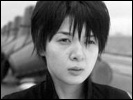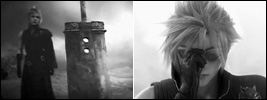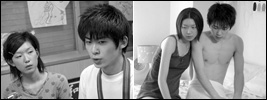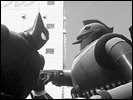- Document type
- Round-up
- Published
- 22 November 2005
Midnight Eye Round-Up
by Tom Mes and Adam Campbell
- Bashing
- Final Fantasy: Advent Children
- Girlfriend: Someone Please Stop the World
- Moon and Cherry
- Tetsujin 28
Bashing
- Original title:
- Bashing
- Director:
- Masahiro KOBAYASHI
- Cast:
- Fusako URABE, Nene OTSUKA, Teruyuki KAGAWA, Ryuzo TANAKA, Takayuki KATO
- Running time:
- 82 mins.
- Year:
- 2005
 When it was announced that Masahiro Kobayashi's Bashing was selected for the 2005 Palme d'Or competition at Cannes - the director's fourth consecutive film to receive the honour - the news raised more than a few eyebrows in the Japanese film industry and among observers of the nation's cinema abroad. Kobayashi is generally not liked all that much, you see. Exactly why remains unclear. There is always a lot of tut-tutting about his supposed copying of French cinema, but he isn't nearly as slavish in his devotion to this as, say, Nobuhiro Suwa. Maybe it's just envy over the fact that Cannes seems to love him so much while he remains merely a marginal figure back home.
When it was announced that Masahiro Kobayashi's Bashing was selected for the 2005 Palme d'Or competition at Cannes - the director's fourth consecutive film to receive the honour - the news raised more than a few eyebrows in the Japanese film industry and among observers of the nation's cinema abroad. Kobayashi is generally not liked all that much, you see. Exactly why remains unclear. There is always a lot of tut-tutting about his supposed copying of French cinema, but he isn't nearly as slavish in his devotion to this as, say, Nobuhiro Suwa. Maybe it's just envy over the fact that Cannes seems to love him so much while he remains merely a marginal figure back home.
Kobayashi is an extremely prolific scriptwriter in the erotic pink film industry, penning screenplays for Toshiki Sato and Toshiyo Ueno. His third film as a director was the pink film One Week (Isshukan: Aiyoku Nikki, 2000). The face the director prefers to promote to the outside world, however, glosses over this fact, preferring to focus on his 'straight' festival successes Closing Time (1997), Bootleg Film (1999), Koroshi (2000), The Man Walking on Snow (Aruku Hito, 2001) and La Coiffeuse (Onna Rihatsushi no Koi, 2004). This double life seems to be another source of discontent, as does his unwillingness to admit that his much vaunted past as an assistant director to François Truffaut is a very generous embellishment of the truth that Kobayashi left for France in hopes of working for the director of The 400 Blows, but returned in 1981 without having even met the man.
For the most part though, Kobayashi doesn't so much go out of his way to hide the 'disreputable' sides of his career as simply not drawing attention to them. It doesn't take much investigation to unearth the fact that, for example, the Locarno prize winner La Coiffeuse, an amour fou starring Kazuki Kitamura and Keiko Oginome, was released in Japan as an entry in the Perfect Education series, or that he also has a healthy career shooting V-cinema yakuza films and cop thrillers.
If there is one thing that connects all of his diverse projects and that marks them out as being Kobayashi's, it's that they are nearly all set in the snowy wastes of Hokkaido. Bashing is no different, utilising the barren, monotonous landscapes as symbols of the despair felt by its main character, Yuko (newcomer Urabe), an aid worker returning home from being a hostage in the Middle East. But the media and her direct environment have no understanding, blaming all the trouble she went through on her own actions and making her out to be a national disgrace for making the government and the country stoop to paying a ransom to get her back. Harassed wherever she goes, the victim of constant crank calls that drive her father and stepmother insane, dumped by her boyfriend and fired from her job as a chambermaid, Yuko is pushed into a corner from which the only escape is to flee Japan and return to the Middle East.
Based on the true story of the Japanese volunteer relief workers kidnapped in Iraq in 2004, of whom prime minister Koizumi publicly declared that everything was their own fault, Bashing was viciously disliked by nearly the entire contingent of Japanese press present in Cannes. So much so that the situation began to resemble the film's subject and Bashing became itself the subject of bashing. Kobayashi was keenly aware of the negative vibe and openly wondered whether he might have to exile himself in France if he wanted to go on making films. That the film would receive strong reactions was to be expected, as it hardly attempts to sugar-coat the situation it presents. Kobayashi is insistent, too much so perhaps. His focus is narrow and somewhat off-balanced, too eager to underline the injustice. His heroine is badgered literally everywhere and by everybody, there is no breathing space and no escape. This might be the reality of the situation, but reality doesn't always make for good cinema.
Nevertheless, Kobayashi sees that something is very, very wrong in his country and he tells it straight to everyone's faces. That others prefer to not confront it is their problem, not the director's, who never flinches. For this, you can only respect him. His breed of ballsy artists is become rarer and rarer in today's cinema, particularly in countries where film is predominantly seen as an industry. Those cantankerous little dissenters need to be cherished, because they contribute to healthy societies. Just for that, the Cannes selection was richly deserved and every bruised toe fully justified.
[TM]
Final Fantasy: Advent Children
- Original title:
- Final Fantasy VII: Advent Children
- Directors:
- Tetsuya NOMURA, Takeshi NOZUE
- Cast:
- Takahiro SAKURAI, Ayumi ITO, Shotaro MORIKUBO, Toshiyuki MORIKAWA
- Year:
- 2005
- Running time:
- 100 mins.
 As I write this, Final Fantasy: Advent Children is the number one DVD in Japan, having sold over 420,000 copies in the first week of release alone. The root of its success must surely be the large fan base that the Final Fantasy series of videogames enjoys. To the less console friendly, the name more likely invokes memories of Square's muddled Final Fantasy: The Spirits Within (2001), the company's first attempt at a computer animated feature film. Returning to the CG field, Advent Children makes a visual departure from the previous movie in eschewing claims of photo realism and settling for a more stylised depiction of the characters and landscapes. Director Tetsuya Nomura makes his living as a videogame character designer, where his style can be recognised by spiky hair, wallet chains and an adherence to the dregs of Japanese street fashion. Advent Children features the spiky haired, wallet chained Cloud, a rebel loner. We know he is a rebel loner because he refuses to answer his mobile phone when people call him, a crime punishable by death these days. He also rides a motorbike, should the point need any further clarification.
As I write this, Final Fantasy: Advent Children is the number one DVD in Japan, having sold over 420,000 copies in the first week of release alone. The root of its success must surely be the large fan base that the Final Fantasy series of videogames enjoys. To the less console friendly, the name more likely invokes memories of Square's muddled Final Fantasy: The Spirits Within (2001), the company's first attempt at a computer animated feature film. Returning to the CG field, Advent Children makes a visual departure from the previous movie in eschewing claims of photo realism and settling for a more stylised depiction of the characters and landscapes. Director Tetsuya Nomura makes his living as a videogame character designer, where his style can be recognised by spiky hair, wallet chains and an adherence to the dregs of Japanese street fashion. Advent Children features the spiky haired, wallet chained Cloud, a rebel loner. We know he is a rebel loner because he refuses to answer his mobile phone when people call him, a crime punishable by death these days. He also rides a motorbike, should the point need any further clarification.
The plot is tenuously thin, and frequently goes nowhere. It is often impenetrable to newcomers and more of an excuse for a series of battles than an actual storyline. This would be passable had writer Kazushige Nojima not insisted on including scenes of mystic-ecological mumbo jumbo and shallow introspection. It seems anyone involved in the videogame industry can't go ten minutes without praying to either of these two gods. Set several years after the end of the game, hero Cloud Strife (Takahiro Sakurai) runs a delivery service with the aid of his partner Tifa. On his deliveries, he is attacked by three brothers who claim Cloud as one of their clan and hound him as to the location of their mother, an alien head in a box. It almost sounds like the beginning to a new Miike film but don't get too excited, there is nothing so interesting going on here. Cue a hundred minutes of tedious fighting and moralising.
One of the more curious aspects of the film is Cloud's relationship with Tifa, voiced by Ayumi Ito of the Shunji Awai films Swallowtail Butterfly (1996) and All About Lily Chou-Chou (2001). Their sterile interactions recall Hong Kong films of the 1980s, where lovers seemed more like reserved platonic life-partners, and Chow Yun-Fat slept in bed with his jumper on. Cloud and Tifa share a business and raise two children, who tellingly are not their own. Rather than a wedding ring, both characters wear a matching red ribbon tied around their arm. They sleep in separate beds and their adult love affair seems relegated to dewy-eyed stares or other stalwarts of pubescent romance. A cynical critic may wonder if any possible romantic element of the film was curbed to appeal more to the designated audience of awkward teenage boys.
What the movie tries to deliver is action, with a number of extended fight sequences littering the film. Unfortunately, almost all of these break central tenets of action direction. On a basic level, acrobatic feats are not impressive if they are not being performed by a human being. Second, casting away the rules means casting away excitement. Several times the film breaks its own movie logic, effectively undermining itself. For instance, if Cloud can survive a fall from 200 metres and land on his feet, why should we worry if he tumbles from his motorbike? If he can deflect bullets from his sword, where is the danger in him being shot at? If neither party can come close to hitting each other, why watch them cross swords? These contradictions of attention lead to most of the battles, upon which the film is hinged, becoming entirely tedious.
Not that the blame rests squarely on the choreography. Tetsuya Nomura and Takeshi Nozue show themselves as perfectly incapable directors, taking full use of their virtual camera to disorientate and annoy the viewer. The directors have obviously never heard of a camera move too intrusive, as they swirl their digital lens up into the air and spin it around each and every character as soon as they do so much as stand up. Quite how the poor workmanship on display made it through the no doubt lengthy animation process unchecked is perhaps the greatest mystery of Advent Children.
The film gained unwarranted prestige by being screened at the Venice and Montreal film festivals. Imagine the surprise of Venice when the 25-minute demo version shown at the 2004 festival made as much sense as the full 100-minute version shown in 2005. Advent Children has little to offer anyone except as an expensive fan fiction, or an occasionally impressive demonstration of some powerful animation technology that will hopefully in the future be put to some better use.
[AC]
Girlfriend: Someone Please Stop the World
- Original title:
- Girlfriend
- Director:
- Ryuichi HIROKI
- Cast:
- Kinuo YAMADA, Aoba KAWAI, Tomorowo TAGUCHI, Aya SUGIMOTO, Shungiku UCHIDA
- Running time:
- 105 mins.
- Year:
- 2004
 Is Ryuichi Hiroki becoming the new Miike? At most film markets this past year, his has been the dominant name in the line-up of Japanese films for sale, supplanting the Audition auteur wrapped up in the 18-month production of The Great Yokai War. Since the magnificent Vibrator established his name on the festival circuit in 2003, Hiroki has steadily been hammering away at his career, churning out four fascinating films in the space of just over a year: the disturbing erotic drama L'Amant, the big-budget melodrama Silent Big Man, the superb It's Only Talk, and the nimble urban girl-girl romance Girlfriend: Someone Please Stop the World.
Is Ryuichi Hiroki becoming the new Miike? At most film markets this past year, his has been the dominant name in the line-up of Japanese films for sale, supplanting the Audition auteur wrapped up in the 18-month production of The Great Yokai War. Since the magnificent Vibrator established his name on the festival circuit in 2003, Hiroki has steadily been hammering away at his career, churning out four fascinating films in the space of just over a year: the disturbing erotic drama L'Amant, the big-budget melodrama Silent Big Man, the superb It's Only Talk, and the nimble urban girl-girl romance Girlfriend: Someone Please Stop the World.
Girlfriend is an entry in the 'Love Collection', a series of six low-budget, DV-shot features obviously modelled after 2000's Love Cinema (which was best known for the Miike entry Visitor Q and to which Hiroki himself contributed Tokyo Trash Baby). Including entries by both established filmmakers such as Kazuyoshi Kumakiri (A Volatile Woman) and promising newcomers like Yuki Tanada (Moon and Cherry, see below), the overall quality of this new venture is astonishingly high, certainly given the restrictions imposed on the filmmakers.
Hiroki's instalment, scripted by Vibrator scribe Shotaro Oikawa, follows the exploits of Kyoko (Yamada), a young upstart photographer whose life is something of a shambles. She has clear aims for herself, but doubts her own ability to achieve them. When one of her many short-term boyfriends, the editor of a magazine with amateur nudes, asks her to take pictures for his publication, she agrees, seeing it as at least a step forward and an opportunity to develop her skills.
Despite the fact that Kyoko's a girl herself, approaching women on the streets and asking them to pose nude for her proves to be quite a chore. At first she accosts every pretty girl that walks by, until Miho (Kawai) catches her eye. Feeling that she has that certain something special, Kyoko insists that Miho pose for her. Her own life floating rudderless after the separation of her parents, Miho accepts, half entertaining the idea to get back at her father (Taguchi), who has gone on to form a new family and who hasn't been in touch with her in years.
The two girls walk around town, Kyoko snapping pictures and listening to Miho's stories. Gradually the two young women begin to sense a mutual attraction. When the time comes to get down to the nitty gritty of the nude shots, the girls' defences come down along with their clothes.
There's a fair share of nudity here, but Hiroki's pink days are long behind him. The lesbian-erotic undercurrent is never played for titillation, the script preferring to focus on the emotional rather the carnal side of things. Shooting the film in fly-on-the-wall documentary style, Hiroki fittingly makes the gazing eye of the camera lens a central part of the film. As Vibrator attested, Hiroki is perfectly at home working in the DV format. His two leads are well cast for their physical differences: Yamada the short-haired tomboy, Kawai the prim, feminine beauty. But while Kawai's talents remain too much limited to her beauty alone, newcomer Yamada is a real discovery, fresh, natural and charismatic.
NB: Not to be confused with World's End / Girlfriend (Sekai no Owari), Shiori Kazama's recent tale of cautious, urban young love.
[TM]
Moon and Cherry
- Original title:
- Tsuki to Cherry
- Director:
- Yuki TANADA
- Cast:
- Noriko EGUCHI, Tasuku NAGAOKA, Misako HIRATA, Akira EMOTO
- Running time:
- 82 mins.
- Year:
- 2005
 In search of extra points, student Tadokoro (Nagaoka) joins the university's erotic writing club, finding a somewhat lifeless gathering of five men around a table. Led by the 56-year-old Sakamoto (veteran Emoto of The Eel and Dr. Akagi fame), who is still enrolled because "being married gives you a discount on tuition," they congregate in a cramped room whose four walls are covered floor to ceiling with nudie posters. The club's sole female member, the spunky Mayama (Eguchi), is also its most talented, already contributing stories to a weekly men's magazine and getting paid for them. Mayama immediately spots the virgin and takes the newcomer back to her place for a deflowering. No sooner has he popped or she is in front of her computer to incorporate the experience in her story, the serialised adventures of 14-year-old virginal boy and the older woman who educates him in the ways of the woman. Tadokoro quickly becomes her case study and model for the ongoing plot, but realises he wants more from this sprightly girl than bouts of skilful sex.
In search of extra points, student Tadokoro (Nagaoka) joins the university's erotic writing club, finding a somewhat lifeless gathering of five men around a table. Led by the 56-year-old Sakamoto (veteran Emoto of The Eel and Dr. Akagi fame), who is still enrolled because "being married gives you a discount on tuition," they congregate in a cramped room whose four walls are covered floor to ceiling with nudie posters. The club's sole female member, the spunky Mayama (Eguchi), is also its most talented, already contributing stories to a weekly men's magazine and getting paid for them. Mayama immediately spots the virgin and takes the newcomer back to her place for a deflowering. No sooner has he popped or she is in front of her computer to incorporate the experience in her story, the serialised adventures of 14-year-old virginal boy and the older woman who educates him in the ways of the woman. Tadokoro quickly becomes her case study and model for the ongoing plot, but realises he wants more from this sprightly girl than bouts of skilful sex.
Another entry in the Love Collection series, Moon and Cherry is a lively, hugely enjoyable romp that reveals two unmistakable new talents in its writer/director Yuki Tanada and its star Noriko Eguchi. Tanada, whose only previous credit is a documentary on wandering folk singer Wataru Takada, directs with relish, creating a funny gender reversal with the gregarious Mayama using the men around her to her own advantage. The film has a celebratory attitude to its plentiful carnal goings-on, with the two leads going at it in bed, on the floor, in front of the computer, in alleyways and up against a vending machine. All the while, Tanada's script maintains a very fine balance between carnality, comedy and drama.
Infectiously played and inventively shot (with excellent DV cinematography from Kei Yasuda), Moon and Cherry emerges as one of the year's most pleasant surprises.
[TM]
Tetsujin 28
- Original title:
- Tetsujin 28-Go
- Director:
- Shin TOGASHI
- Cast:
- Shosuke IKEMATSU, Yu AOI, Yuko NAKAZAWA, Akira EMOTO
- Year:
- 2005
- Running time:
- 113 mins.
 Gigantor is one of the true classics of anime's much-loved giant robot genre. Created in the mid-1950s by Mitsuteru Yokoyama, the series about the pointy-nosed robot and its 12-year old guide Shotaro is still fondly remembered by both Japanese and American audiences.
Gigantor is one of the true classics of anime's much-loved giant robot genre. Created in the mid-1950s by Mitsuteru Yokoyama, the series about the pointy-nosed robot and its 12-year old guide Shotaro is still fondly remembered by both Japanese and American audiences.
The anime was updated and modernised in the early 1980s, but this nostalgic live action debut goes back to the original designs, for both its robotic and its human characters. So enamoured is this production of the original animated series, that its CGI metal giants are intentionally rendered less to appear realistic than to resemble handdrawn animated creatures. The people behind Tetsujin-28 in fact completely resist the temptation to jazz it up and use the premise as an excuse for a flashy computer graphics showcase. The tone of the film is refreshingly modest: the title robot is slow and clunky and literally comes across as if remote-controlled, set and character design remains thoroughly of the old school, the story is simple and there isn't the slightest hint of wink-wink irony or pompous revisionism. This, simply put, is the anti-Casshern.
When a black robot blazes a trail of destruction through Tokyo and the government receives an extortion note from a mysterious individual named Zero, officials are at a loss to stop the threat. Scientist Dr. Shikishima, however, knows that there is one thing that could defeat the black giant: another robot abandoned in a long-forgotten laboratory. The only problem is, its creator is dead and the only person who can control the gargantuan hunk of metal is his now twelve-year old son, the timid Shotaro. This knowledge, however, has been buried somewhere inside the boy's photographic memory since the time he witnessed the ill-fated unveiling of the creature at the age of three, the very event that took his father's life.
Sporting a healthy sense of humour about itself, a set of interesting characters incarnated by several fine actors and a commendable resistance to the urge to show off, Tetsujin 28 brings a pleasant and much needed dose of sanity back to the CGI blockbuster arena.
[TM]